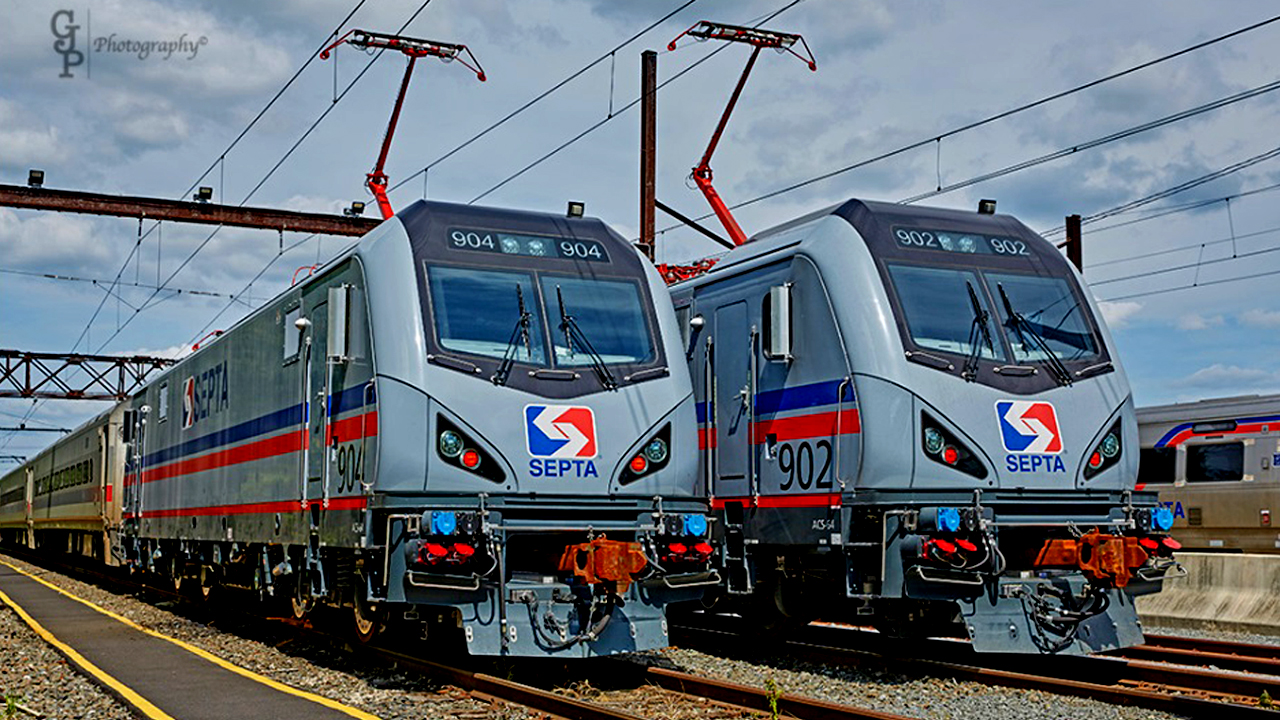
SEPTA FY2025 Proposed Budget: $2.6B
Written by William C. Vantuono, Editor-in-Chief
SEPTA Siemens ACS-64 electric locomotives. Photo by Gary Pancavage
SEPTA (Southeastern Pennsylvania Transportation Authority) has proposed a $2.6 billion Fiscal Year 2025 budget consisting of a $1.74 billion Operating Budget and $922.8 million Capital Budget.
Pennsylvania Governor Josh Shapiro’s proposed $283 million annual statewide operating investment in public transportation includes $161 million for SEPTA. It would be Pennsylvania’s largest transit funding increase in more than a decade. SEPTA said its FY2025 budget “assumes the state funding plan passes the General Assembly as proposed, and with a historic increase of $24 million in local match tied to it, SEPTA will avoid devastating service cuts and fare increases that would cripple mobility across Southeastern Pennsylvania.”
SEPTA’s $1.74 billion Operating Budget Proposal includes a doubling in funding for “safe, clean, and secure initiatives” since Fiscal Year 2022: $72 million for funding 40 additional police officers, 30 additional safety professionals, and 100 additional cleaners. The proposal also features ongoing expansion of SEPTA Key Advantage, which now has 50 partners and 91,000 participants, as well as SEPTA’s Efficiency and Accountability Program, which the agency said “has already recognized $50.2 million in annual recurring benefits.”
The $922.8 million Capital Budget Proposal is part of an all-time high $14 billion 12-year Capital Program “enabling the largest-ever investments in improved safety, cleanliness, and security, supported by the Infrastructure Investment & Jobs Act (IIJA),” SEPTA said. The proposal includes new full-length fare gates to reduce fare evasion and new cleaning equipment to support the expanded cleaning staff.
“By the end of the 12-year program, all Broad Street Line, Market-Frankford Line and Trolley trips will be through an accessible station, compared to 61% today,” the agency said. “SEPTA continues to operate one of the oldest rail fleets in the country, and for the first time, this budget funds at least a partial replacement of each aging fleet. The Broad Street Line, Market-Frankford Line and Trolley fleet replacements are all fully funded, while the Regional Railcar fleet replacement is partially funded.”
“These investments are bolstered by historic success in competitive grant programs, including a recent $317 million grant from the Federal Transit Administration to replace the Market-Frankford Line fleet, which is more than three times larger than any competitive grant that SEPTA has ever received,” the agency noted. Since November 2021, SEPTA has secured $524.3 million of the $957 million in IIJA discretionary funding awarded to the region.
“With the additional funding in place, SEPTA is poised to make historic investments,” said SEPTA CEO and General Manager Leslie S. Richards. “These investments will propel SEPTA forward and help continue to grow ridership, with more than 700,000 daily customers representing 70% of pre-COVID ridership levels and climbing.” However, she cautioned, “Despite higher than ever funding levels, SEPTA remains significantly below peer regions in annual transit capital investment. Southeastern Pennsylvania is leaving money on the table. Additional local funding is needed as a match on the highly competitive federal grant opportunities that are available through the IIJA.”
SEPTA added that, for the first time, the its Operating and Capital Budget proposals are being presented as an integrated document on a modern web platform, which is ADA compliant “to ensure that people with visual or hearing impairments can navigate SEPTA’s budget data.”
In a related development, SEPTA and the Brotherhood of Locomotive Engineers and Trainmen (BLET), representing Regional Rail engineers, have reached a tentative agreement, according to The Philadelphia Inquirer.
The newspaper reported that the three-year deal was approved by the SEPTA Board on June 27; it will “shorten from 15 years to seven the time required for an engineer to reach the top of the wage scale, a change long sought by the union,” which represents approximately 170 SEPTA engineers.
“Wage compression, combined with the agreed to annual rates … will bring us closer to our peers in the industry and help SEPTA recruit and retain the engineers needed to keep the trains moving,” said Don Hill, a Regional Rail engineer and General Chairman of BLET Division 71, according to The Inquirer.
SEPTA also reported reaching a separate tentative agreement with International Association of Sheet Metal, Air, Rail and Transportation Workers, Transportation Division (SMART-TD), Division Local 61, which represents approximately 400 Regional Rail conductors and assistant conductors; the Board approved that contract, as well, according to The Inquirer.
“After 15 years on the job, SEPTA locomotive engineers are paid $39 an hour — compared to an average of about $50 an hour for their counterparts at other passenger railroads in the region, said James P. Louis, a national vice president for the BLET union,” The Inquirer reported. “The wage comparison is based on pay at Amtrak, NJ Transit, the Long Island Railroad, Metro-North, and PATH, which links Newark, Jersey City, and Hoboken to Manhattan, Louis said. … The engineers and conductors would each get raises of 13% in stages, starting when the unions ratify the contracts to February 2026, according to SEPTA summaries. Time until top pay scale would also shorten from 15 years to seven for
conductors and assistant conductors. BLET’s national office will mail ballots to its members at SEPTA and report results of the ratification vote on July 17, the union said. Regional Rail workers also would be eligible for pandemic bonuses of up to $2,200 and signing bonuses of $3,000, as well as four weeks’ paid pregnancy disability leave and two weeks of paid parental leave.”
The SEPTA Board approvals of the BLET and SMART-TD tentative agreements follow the June 24 announcement by the National Mediation Board “that, pursuant to the Railway Labor Act, New Jersey Transit Rail Operations (NJ Transit) and the Brotherhood of Locomotive Engineers and Trainmen (BLET) were released … from statutory mediation … and a 30-day cooling-off period begins on June 25, 2024.” The cooling-off period maintains the “status quo”: The union doesn’t strike and the railroad doesn’t lock out employees.



